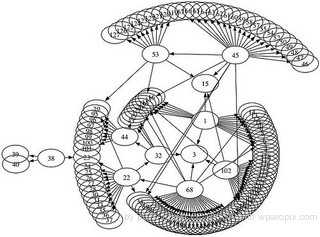The Final Nail In the Coffin of Cheap SEO – The End of Paid Links

If you have anything to do with internet marketing, web design or SEO you have no doubt heard about the latest smack down on blog networks and paid links. All of this coming on the heels of Panda last year can be enough to strike fear into the heart of anyone who relies on the internet to make a buck. I have heard of people who's entire income has been wiped out. Literally over night. Do these latest attacks put the final nail in the coffin of cheap SEO.
For those of you who haven't heard about Panda and Google's attacks on paid links, because you rely on someone else for your marketing or SEO, you need to be informed. You already know that Google is the mother of all search engines. And you know that if you want traffic from people searching for your product or service, you need to be on the first page of Google's search results.
Well, it is Google's job to try and move the most relevant searches to the top of the list. And it’s an SEO's job to move your content to the top of the list. When both of these goals align, everyone is happy. Unfortunately, that is not always the case.
What the Heck is Panda – How Can Something So Cute Be So Bad
The problem is, Google is far from perfect, and this means that people will always try and figure out how their algorytym works, and they will
manipulate it to move their sites rankings to the top. This all can work really well for a while. Until too many internet marketers manipulate ranking of too many crap sites. Then Google starts showing garbage content at the top of their search engines, and they are forced to change their algorithms in order to get rid of the crap.
In February of 2011, Google announced what is known as Panda, which was a direct attack on garbage content. What does Google describe as garbage? Anything that is not new, poorly written, or in its words, does not add any value. You can find more about Panda here.
Over the last couple of weeks the big news, was Google bringing down a couple of huge blog networks. Two of the big ones that were hit, were “Build Your Rank” and ALN, but over the last couple of years there have been others. These 2 take downs have generated fear throughout the SEO community. Not necessarily because they used these networks (although many did, and with great success), but because they wondered what hammer they were going to bring down next.
As you probably know a large part of Google’s ranking is based on the number of links that are pointing back to your website. This means that a large part of SEO, is what is known as off page SEO.
Off Page SEO is responsible for probably about 70% of your overall results when people are searching for keywords – which are what lead people to your website. This is because the search engines see links as a vote of confidence for your site. So, it stands to reason, that the more links you get, the better you do in search.
Or, at least it did, and maybe still does, more about that later.
Paid Links and Blog Networks
Since so much emphasis is placed on links and link building, people look for every opportunity they can find to get links. And that is where blog networks and paid links come into the equation.
Blog networks, are big interlinked groups of sites all joined together. The theory is, each blog passes page rank, or what is known as link juice to each other. This link juice gets passed around and builds, and finally goes back to your site, boosting your ranking.
Paid links on the other hand, are links that are purchased from other sites, in order to pass this page rank back to you. Paid links can encompass any link that you spent money, or rendered services to obtain. Which means they include link exchanges (since you are giving a link in return for getting one in return.
Both of these practices are against Google's Webmaster Guidelines.
What’s Changed
This is not new; this has been against their guidelines forever. So what has changed?
Simply their ability to catch you if you participate in any of these schemes.
Starting with Panda, and then continuing with this latest round of algorithm changes, the company is clearly on a mission to do away with any type of manipulation of its search results. And, it’s only going to get worse (or better, depending on your perspective. More on that in a moment).
On March 16th, Matt Cutts, the head of Google’s web spam team warned that over the next couple of weeks and months, new changes are going to begin to punish sites with “too much SEO”.
Should You Be Scared
What? Too much SEO? Duplicate content penalties, site de-indexing, reduces ranking? Once again, it is enough to strike fear into the hearts of anyone who counts on the internet for any of their marketing.
And believe me, people have been scared.
The internet has been full of hundreds, if not thousands of posts preaching doom and gloom. I have to admit, I bought into some of the fear. That’s why I haven't written anything in a while. I have been buried in research trying to find out what all of this means. What harm has been done, and more importantly where to go from here.
So, by now, I am sure you are wondering what you should be doing, and whether you should be a little worried. Or, if you should seriously be freaking out.
Don’t Panic
First of all, don't panic. I know I felt that sinking feeling in the pit of my stomach all too well. You may be feeling it now to.
First of all, let me state for the record, that Google is not the government. You can't go to jail for violating their terms of service. You could have a link from every bad neighborhood in the world, and as long as you didn't commit fraud to get them there, you haven't broken the law.
They do however have the ability to hurt your business, so let’s talk about specifics.
My first concern was about having too many links pointing back to a site. Close to a million webmasters have received a warning in their accounts about having links that look “unnatural”. This is probably the biggest fear that I had, since technically any linking that you do outside of your own site is considered unnatural. This would include things like posting your own blog on your Facebook page.
Now, I don't think that anyone is going to come after you for a few links that you may have placed yourself in social bookmarking sites, directories or Facebook profiles. But, if you have thousands of incoming links, especially coming from bad neighborhoods, you might have some cause for concern. And Google is sending people a nice little warning reminder of that.
However, even if you get that mail, there probably isn't any serious need to throw up your arms in dispair. Treat it as a warning, but don’t give up. According to Dan Thies and Leslie Rohde at SEO Brain Trust, in their Special Emergency “Don't Panic” Webinar, the effects of too many links seem to be minimal. And they also say that just because you got a warning, does not mean you are penalized.
I Agree
Why do I agree? Well the first thing that popped into my head after hearing this was negative SEO. Find a competitor, buy a million links from cheap sites, and point them to a competitor.
Its true, Matt Cutts has changed their wording in some of their documents slightly. They used to say that it was impossible to affect a competitors ranking. Now they say it is very difficult.
I take that to mean that if you have a few links out there that are not “natural” they probably won't actually hurt you. They just won't help you any more, or at least not as much. This means, that if you have great rankings now, but your entire link profile is built up of these “bad links”, your rankings will probably drop. Not because of a penalty, but because you were artificially ranked before, and now you are not.
It appears, that actual penalties and worse, complete de-indexing are not caused by these artificial links. At least not unless there are many more than just a few. They are more likely caused by you either being an active participant, which means you also link out to these different schemes. Or you have poor value content on your site like duplicate information. Or just plain crappy or keyword stuffed content.
Whew, Breath, Relax
That one point alone should bring on a big sigh of relief if you are scared you may have engaged in any grey hat, or aggressive techniques of link building in the past. It means that if you haven't been hit yet, even if you have gotten a warning, there is still time to focus on the things you do have control over. You might feel a momentary bump, but if you get on board and start improving your site now, you can still build a business that will last long term.
So, what should you do?
I could go into more details, and will in future blog posts, but to start with, it is time to start doing things the “right” way as opposed to the “sneaky” way. Google is smart, they will catch up to you. Start adding value to the web instead of helping to grow the mountains of garbage that are out there.
Create content that will be of value to your readers. Not loads of spun, PLR content and other junk. You can't get away with that anymore. Get rid of any duplicate, especially lousy duplicate content on your site or blog.
Kill Your Outward Facing Bad Links
Remove all of your outgoing links to bad neighborhoods. This should be done immediately, or sooner. You know what they are. Blog networks, sneaky link exchanges, article syndication networks, etc. With outbound links, you are definitely participating in an artificial link building scheme, and for that, Google will penalize you. They could even de-index you, which is the ultimate penalty.
Ugh, What if You Know You Have Some Unnatural Links
A question that I am hearing a lot, is “Should I try to track down and delete all of the spammy links that are pointing at my site.”
This one is controversial.
There are basically to trains of thought on this. One camp, like Offervault will tell you its time to delete those spammy links as soon as possible. Another line of thought will tell you that since these links aren’t worth much, you should be out there getting even more, and being even more aggressive.
My Opinion
Obviously, if there are some easy links out there to get rid of, from really bad neighborhoods, you might want to think about taking them down if possible. But remember what I was saying earlier about negative SEO? The amount of return you get will probably be minimal. The same is true of “being more aggressive”, sure, you may see some short term gains, but in the long run those will be lost, so you are throwing away some money. If all you care about is short term gains, you can give it a shot, but Google penalties may be more severe in the future, so be careful and be warned.
Instead, focus on doing things right going forward. Good content and great social engagement. They may take a while to get traction on, but that is what is going to move you forward long term.
What Does this Mean for Cheap SEO
Building cheap links is easy and it is cheap. More and more companies are opening every day selling search engine optimization services for $300 – $500 – $1000 per month. Do it yourself services and software will create 1000’s of backlinks with almost no effort at all for $250 / month. I am not mentioning any names, but they are easy to find.
The worst part is these techniques worked well in the past. That means if your focus was on quality instead of quantity, you were often beat out by spammers going after quantity. You were practically forced to add some more aggressive link building in order to be found in the first place. This has changed, and quality is now a much more important piece of the equation.
But, quality comes at a price. For example, you can easily contract a writer in India to create you a new article for 5 bucks. You may not be able to read it, but the search engines could see all the keywords and gave you credit for it. So for $300 bucks, you could have 10 or 20 articles, each submitted to 50 different article directories, and socially bookmarked all over the place.
You could join a blog network, and get thousands of links back to your money site for $60 / month, or really go crazy and create forum profiles, blogs and other accounts with automated software for about $300.
That Dog Don’t Hunt No More
In the new world, that approach is not going to work. Or at the very least, depending on which SEO camp you follow, you are going to need a lot more of it. You need quality content and quality social engagement. And quality is going to cost more. You can’t write 20 quality articles or blog entries and get them posted for $20. And getting them shared will be even tougher. You certainly can’t get people to socially engage with your brand.
Even if you belong to the camp that says you just need to do more, more means a lot more money. And even most of those people realize that the content on your main site needs to be of high quality. They just differ on opinions of what needs to be done off your site.
In Closing this Can Be Good News
Earlier in the post, I mentioned that more changes were coming. And that could be either worse or better depending on your perspective. Historically, quantity often won out over quality. Going forward, quality is going to be more of a concern. Although quantity will still be important, at least as far as content goes.
This is great for you if your site offers value to your readers. It means more solid first page rankings if you continue to put out the quality content. If however you want to stick to the one page website and black hat techniques, it might be time to consider a new career.
One thing that I think is certain, is the days of cheap SEO are numbered. Usually, when technology is new, it is expensive, and then as it becomes more popular and available, prices go down. This has definitely happened in the SEO industry. But in the case of SEO, that value is also decreasing. Cheap SEO may be around forever, but its value, its piece of the internet marketing pie, is going to decrease as well, opening all types of opportunities for businesses who want to get back to basics and offer great value to their customers. SEO needs to be a piece of your overall marketing puzzle, not the entire business model.
Googles latest algorithm changes, and especially their attacks on blog networks and paid links have people freaking out, wondering what to do next. The answer is, focus on what's important, like content and delivering value. Not cheap tactics like blog networks, paid links, automatic spinning and spam. Take the first step to creating great content and building value with our free Power Blogging Ebook.
If you think your site might have been hit with a penalty, or you are experiencing a loss in rankings we can help. Contact us for a free website and internet marketing analysis and discover how you can get your site back into the search engines good graces. Click Here to Schedule.

Related articles









